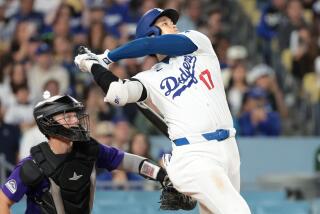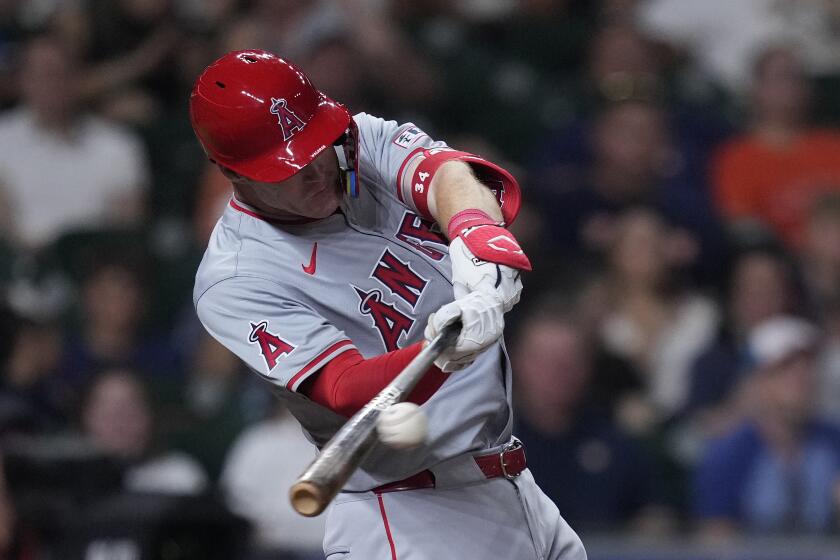It’s Pedal to Metal on New TV Deal
NASCAR announced an eight-year, $4.48-billion television deal Wednesday that will pay the racing organization 40% more per year, beginning in 2007, than it receives under its current agreement.
At $555 million, NASCAR would rank fourth in annual revenue for televised professional sports, behind the NFL at $3.735 billion, the NBA’s $767 million and Major League Baseball’s $713 million.
NASCAR’s 36-race season will be shared by Fox, ABC, ESPN and TNT. ABC will televise at least 11 of the season’s last 17 races, including the entire 10-race “Chase” for the championship.
“We are now partners with three huge media companies -- News Corp., Disney and Time Warner,” said NASCAR Vice President Dick Glover, referring to the networks’ parent companies. “You can’t get much bigger than that.”
It marks a return to the sport that claims to be the second-most watched on television for Walt Disney Co.’s ABC and ESPN, which have not televised NASCAR since 2000.
“ESPN once said that America’s appetite for sports is insatiable, and this just proves that media companies’ appetite for sports is insatiable,” said Paul Swangard, managing director of the Warsaw Sports Marketing Center at the University of Oregon.
The increasing appetite of advertisers to associate their names and brands with NASCAR helped to drive up the broadcast fees. With advertisers so smitten with NASCAR, network executives felt more comfortable agreeing to write these big checks, analysts said.
“The reality is that NASCAR has become appointment television. It has a tremendous following, both with fans and also from corporate America. The advertisers have really had great success marrying up their brands with NASCAR,” said Bob Gutkowski, president of Marketing Group International and a former president of Madison Square Garden.
An appealing element for networks and their advertisers is that NASCAR holds up well in a world of digital video recorders, analysts said. Since cars and drivers are plastered with ads, viewers might fast-forward through commercials, but they can’t avoid all the advertising.
Networks also don’t need to worry about a strike or lockout upsetting the schedule.
“They are the one major sports league that doesn’t have a union,” said David Carter, executive director of the USC Sports Business Institute. “It’s those worries about an impasse with labor that make networks and advertisers queasy. But there aren’t those concerns with NASCAR.”
Beginning in 2007, Fox will televise the first 13 races of the season and will have the Daytona 500 -- considered the Super Bowl of stock car racing -- every year. Fox currently alternates showing the Daytona 500 with NBC, which is not part of the new deal. NBC will televise next year’s Daytona 500 even though it takes place during the network’s Winter Olympic coverage.
TNT will show six midseason races.
Fox, despite getting Daytona 500 exclusivity, will pay NASCAR $208 million compared to the $200 million it now pays.
ABC and ESPN will pay $270 million a year, which is less than the $296 million a year ESPN recently agreed to pay baseball for eight years beginning in 2006.
The ABC-ESPN deal includes the Busch series for ESPN2, plus multimedia rights for various platforms, including the Internet and cell phones.
TNT will pay $85 million a year for its six races beginning in 2007. TNT and NBC now share paying $200 million a year for NASCAR.
Speed Channel, which is owned by Fox’s parent company, News Corp., gets the Craftsman Truck series, except for two races to be televised by Fox. Speed Channel also gets NASCAR’s annual All-Star challenge.
The deal with Fox gives NASCAR 100% control of NASCAR Images, which is comparable to football’s NFL Films. Fox and NASCAR have been 50-50 partners since 2002 in the company based in Charlotte, N.C.
Glover said controlling the company “allows us to increase our overall media coverage without cost concerns of a partner.”
Ray Evernham, who owns cars driven by Jeremy Mayfield and Kasey Kahne, said the new deal is extremely valuable for racing teams.
“When a TV package grows, it says there is interest in the sport and people are watching, that the sport is healthy,” Evernham said.
“That brings the value of the advertising up. When the advertising value is up, the real estate on my car is worth more. That’s important for an owner.
“I think it will trickle down to everybody, whether it’s track owners or people who work in the shop. Our guys, a lot of them are paid on performance, so if the car earns more, their bonuses are bigger.”
As a rule, drivers keep 40% to 55% of winnings; the rest goes to the team.
Series champion Tony Stewart won nearly $7 million this season, 26 drivers won more than $4 million and 41 earned more than $1 million.
Times staff writer Martin Henderson contributed to this report.
*
BEGIN TEXT OF INFOBOX
Big league pacts
Here are some of the major TV contracts in sports. FOOTBALL
* In April 2005, the Walt Disney Co. signs an eight-year pact to broadcast “Monday Night Football” on ESPN for $1.1 billion per year starting in 2006.
* NBC agrees in 2005 to pay $600 million per year for six years of Sunday night football.
* CBS and Fox agree in 2004 on a six-year deal to broadcast National Football League games for $1.3 billion a year. CBS will pay $622.5 million per year and Fox $712.5 million per year.
* In total: Starting in 2006 season, the NFL will receive $3.735 billion per season for TV.
BASKETBALL
* In January 2002, the National Basketball Assn. signs a six-year agreement, from the 2002-03 season to the 2007-08 season, with ABC, ESPN and TNT ($767 million per season):
MOTOR RACING
* NASCAR announces Wednesday a TV deal with ABC and ESPN replacing NBC as a broadcast partner.
BASEBALL
* Major League Baseball has an eight-year extension with ESPN worth $296 million a year. Fox’s deal, which expires in 2006, is worth $417 million a year.
Source: Times research
More to Read
Go beyond the scoreboard
Get the latest on L.A.'s teams in the daily Sports Report newsletter.
You may occasionally receive promotional content from the Los Angeles Times.











